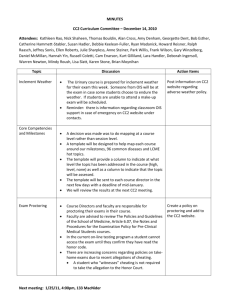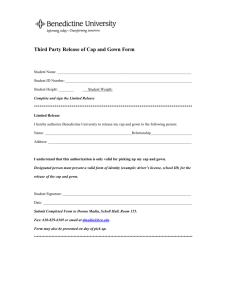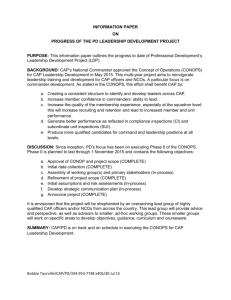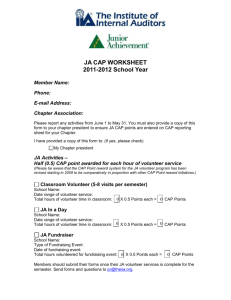The Role Ethics Plays in Civil Air Patrol
advertisement
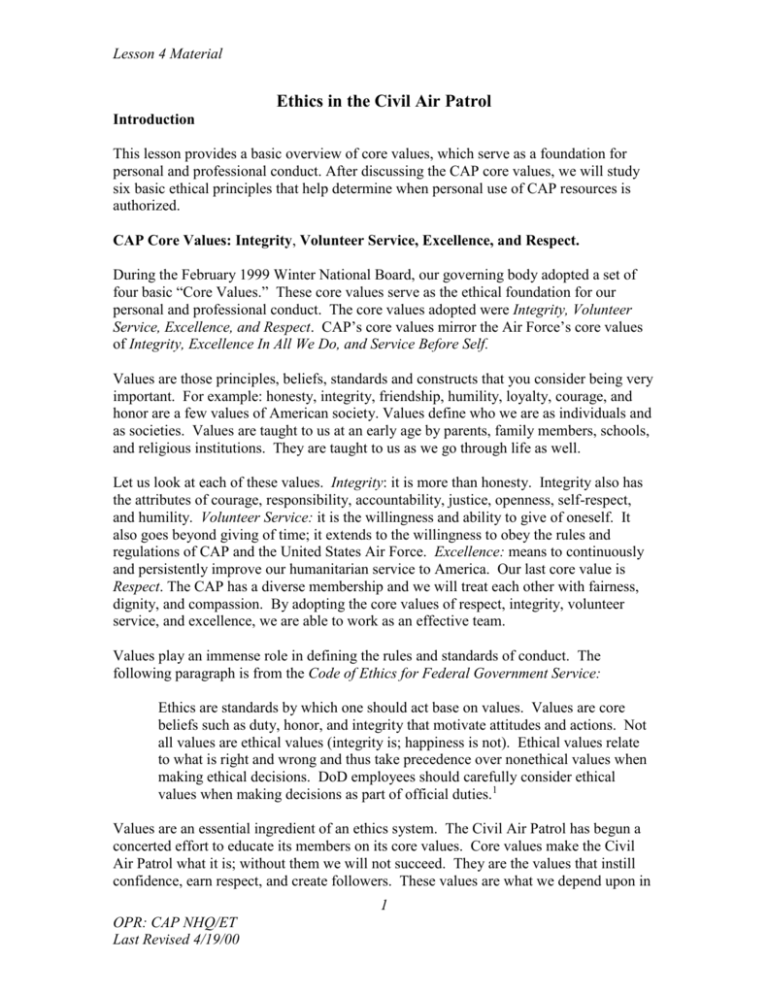
Lesson 4 Material Ethics in the Civil Air Patrol Introduction This lesson provides a basic overview of core values, which serve as a foundation for personal and professional conduct. After discussing the CAP core values, we will study six basic ethical principles that help determine when personal use of CAP resources is authorized. CAP Core Values: Integrity, Volunteer Service, Excellence, and Respect. During the February 1999 Winter National Board, our governing body adopted a set of four basic “Core Values.” These core values serve as the ethical foundation for our personal and professional conduct. The core values adopted were Integrity, Volunteer Service, Excellence, and Respect. CAP’s core values mirror the Air Force’s core values of Integrity, Excellence In All We Do, and Service Before Self. Values are those principles, beliefs, standards and constructs that you consider being very important. For example: honesty, integrity, friendship, humility, loyalty, courage, and honor are a few values of American society. Values define who we are as individuals and as societies. Values are taught to us at an early age by parents, family members, schools, and religious institutions. They are taught to us as we go through life as well. Let us look at each of these values. Integrity: it is more than honesty. Integrity also has the attributes of courage, responsibility, accountability, justice, openness, self-respect, and humility. Volunteer Service: it is the willingness and ability to give of oneself. It also goes beyond giving of time; it extends to the willingness to obey the rules and regulations of CAP and the United States Air Force. Excellence: means to continuously and persistently improve our humanitarian service to America. Our last core value is Respect. The CAP has a diverse membership and we will treat each other with fairness, dignity, and compassion. By adopting the core values of respect, integrity, volunteer service, and excellence, we are able to work as an effective team. Values play an immense role in defining the rules and standards of conduct. The following paragraph is from the Code of Ethics for Federal Government Service: Ethics are standards by which one should act base on values. Values are core beliefs such as duty, honor, and integrity that motivate attitudes and actions. Not all values are ethical values (integrity is; happiness is not). Ethical values relate to what is right and wrong and thus take precedence over nonethical values when making ethical decisions. DoD employees should carefully consider ethical values when making decisions as part of official duties.1 Values are an essential ingredient of an ethics system. The Civil Air Patrol has begun a concerted effort to educate its members on its core values. Core values make the Civil Air Patrol what it is; without them we will not succeed. They are the values that instill confidence, earn respect, and create followers. These values are what we depend upon in 1 OPR: CAP NHQ/ET Last Revised 4/19/00 Lesson 4 Material difficult situations. In essence, they are the pillar of our professionalism and provide the foundation of the CAP program. CAP ethical principles. The four CAP values build on six basic principles and concepts that apply to ethical conduct. The principles are: loyalty of members, honest effort in performing duties, impartiality, protection of federal property, disclosure of Waste, Fraud and Abuse, and satisfaction of financial obligations. CAP members should apply these concepts to their conduct and behavior. By applying these ethical concepts to their conduct and behavior, CAP members will avoid the appearance of violation of the laws governing ethics. If you have any questions about CAP ethics contact your unit ethics official. One of the ethical issues will discuss in further detail is the use of CAP resources – equipment, communications, vehicles, and your CAP position. The general rule for the use of resources is found in 5 Code of Federal Regulations (CFR) 2635.101(b)(9). It states that “employees shall protect and conserve Federal property and shall not use it for other than authorized purposes.” If you are not sure if a particular use is authorized, seek guidance from your supervisor or call the Ethics Officer. So what is authorized? Most of us have known for a long time that we may use CAP resources only for authorized purposes. However, most of us have assumed that the only authorized purposes were for those duties directly related to the accomplishment of our CAP mission. Certain personal uses may also be authorized. However, these uses are very limited, and we must use caution when approving the use of CAP resources. Let us look more closely at when personal use may be authorized. A CAP supervisor may authorize personal use of CAP resources if it is supportive of the mission. Listed below are some simple tests. The use does not adversely affect the performance of official CAP unit mission. The use is of reasonable duration and frequency. The use serves a legitimate public interest (such as reducing disruptions to the workplace, enhancing professional skills, and supporting CAP community relations). The use does not reflect adversely on DoD or CAP (such as commercial activities, unofficial advertising, or violating a CAP regulation). The use creates no significant additional cost to CAP or DoD. When deciding if the personal use of CAP resources is authorized or not, a balance test is usually involved. The value to the CAP is weighed against the cost to CAP. Additional factors, such as susceptibility of abuse, visibility, and sleaziness are also considered. The bottom line, however, is that in order for any use to be authorized; it must be for the benefit of the CAP. 2 OPR: CAP NHQ/ET Last Revised 4/19/00 Lesson 4 Material Conclusion The Civil Air Patrol core values are Integrity, Volunteer Service, Excellence, and Respect. Core values are the foundation for six basic ethical principles. These principles are: loyalty of members, honest effort in performing duties, impartiality, protection of federal property, disclosure of Waste, Fraud and Abuse, and the satisfaction of financial obligations. We finished this lesson with a discussion on how to determine when personal use of CAP resources is authorized. 1 Code of Ethics for Government Service, On-line Internet available from http://www.dtic.mil/defenselink/dodgc/defense_ethicsindex.htm, sec 3. 3 OPR: CAP NHQ/ET Last Revised 4/19/00
